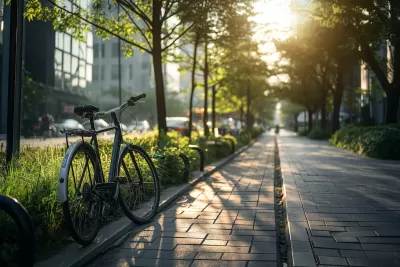Discover how the Sustainable Urban Design Framework helps planners create livable, sustainable communities. Nico Larco from the University of Oregon explores a new tool and book in the latest “Talking Headways” podcast.

Urban planners are increasingly grappling with the difficult task of how to create more sustainable and livable communities. This has been challenging as sustainability in urban design is a complicated topic that includes a wide range of scales, disciplines, and areas of expertise. In the latest episode of the “Talking Headways” podcast, Nico Larco from the University of Oregon discusses a new, comprehensive approach based on the Sustainable Urban Design Framework and how it can be used by planners, designers, elected officials, and community stakeholders. The framework organizes a new book by Larco and Kaarin Knudson titled the Sustainable Urban Design Handbook (excerpts here).
The podcast gives an overview on the framework and describes its five sustainability-focused outcome areas (Energy Use and GHG based on Transportation and Land Use, Water, Ecology and Habitat, Energy Use and GHG Production (Non-Transportation), and Equity and Health) and four scales of intervention (Region/City, District/Neighborhood, Block/Street, Project/Parcel).
The podcast also dives deep on a few topics such as the critical role density plays in many aspects of sustainable communities. Often, in the US, sustainable approaches seem to be a band-aid trying to address a lack of underlying density. Creating density requires a multifaceted approach and can impact mode choice, stormwater management, ecological health, energy use, and resident's cost of living, access to goods and services, amount of physical activity, safety, and ability to improve their socio-economic condition.
This podcast serves as a quick introduction to this new tool that can help with design, planning, and community engagement around sustainability and livability.
FULL STORY: Sustainable Urban Design - Nico Larco on the Talking Headways Podcast

Maui's Vacation Rental Debate Turns Ugly
Verbal attacks, misinformation campaigns and fistfights plague a high-stakes debate to convert thousands of vacation rentals into long-term housing.

Planetizen Federal Action Tracker
A weekly monitor of how Trump’s orders and actions are impacting planners and planning in America.

Chicago’s Ghost Rails
Just beneath the surface of the modern city lie the remnants of its expansive early 20th-century streetcar system.

Bend, Oregon Zoning Reforms Prioritize Small-Scale Housing
The city altered its zoning code to allow multi-family housing and eliminated parking mandates citywide.

Amtrak Cutting Jobs, Funding to High-Speed Rail
The agency plans to cut 10 percent of its workforce and has confirmed it will not fund new high-speed rail projects.

LA Denies Basic Services to Unhoused Residents
The city has repeatedly failed to respond to requests for trash pickup at encampment sites, and eliminated a program that provided mobile showers and toilets.
Urban Design for Planners 1: Software Tools
This six-course series explores essential urban design concepts using open source software and equips planners with the tools they need to participate fully in the urban design process.
Planning for Universal Design
Learn the tools for implementing Universal Design in planning regulations.
planning NEXT
Appalachian Highlands Housing Partners
Mpact (founded as Rail~Volution)
City of Camden Redevelopment Agency
City of Astoria
City of Portland
City of Laramie





























